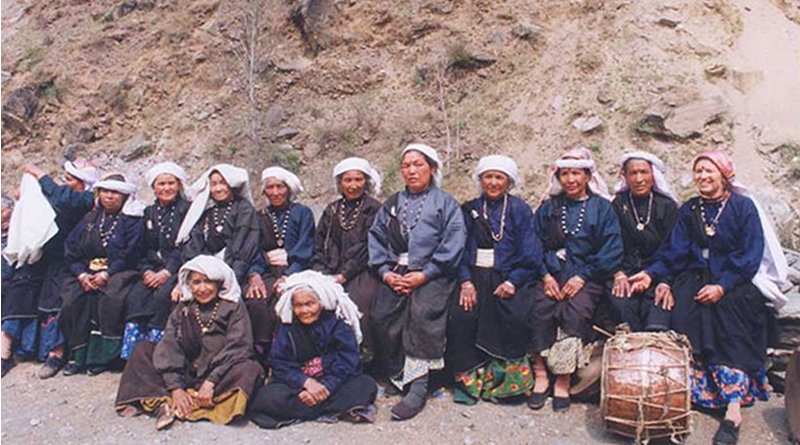Grassroots Chipko Women Struggle Sparked Eco-Feminism – OpEd
The Chipko movement of the Garhwal Himalayas is the best recorded struggle to symbolize the relationship between women and the environment. Chipko means “hugging” in Hindu, gained worldwide publicity in 1960s through the action of villagers, mostly women, who hugged trees to prevent them from being cut.
The movement was successful in getting the Indian government to support a moratorium on tree felling and pay attention to the need for broad-leaved indigenous trees to prevent soil erosion and support subsistence economies of local villages.
The Chipko women argued that commercial pine and eucalyptus tree plantations provided work for male villagers but did not meet the needs of women who are involved in all cultivation work in farming and relied on trees for fuel, food and fodder for animals.
Origin of Tree-Hugging
Tree-hugging, by Indian historical accounts, grew out from events and actions involving long and purposeful struggle of politically-motivated followers of Ghandhi to protest 300 years ago the death of women who hugged sacred trees to save them but eventually were killed in the process.
Tree -hugging re-emerged in 1974 in the village Reni in Uttar Pradesh when women studied, ecology, especially the traditional relationship of hill people to their environment, particularly of trees.
I visited Pune, Maharahstra recently where I found the Chipko movement highlight political struugles of women to be recognized. All-women councils were emerging with campaign slogans “hirvi dharti, stri shakti, manav nukti” (green Earth, women’s power, human liberation).
Today, world-recognized nuclear physicist Dr. Vandana Shiva of the Foundation for Science, Technology and Natural Resource Policy, inspired by the Chipo movement campaigns worldwide for forest protection and for the role of women in the wider defence of local environments on which the depend for food, water, forage, and fuel.Her eco-feminism is based on the observation that for poor rural women in the South, their link with their natural world, is the reality of their daily lives; all struggle is ecological struggle.
The Chipko movement now symbolizes Third World resistance to misdirected “international development”.
Kenya Green Belt Movement
The Kenya Green Belt movement provides inspiration for wider ecofeminist movement. The movement was not spontaneus action but inspired Anatomy professor Wangari Maathai to luanch a rural tree planting program.The movement perceived the program as women-owned ad managed and aimed to solve fuel scarcity and prevent creeping desertification and erosion. The intention was to surround each village with at least a thousand trees.
Women oranizations responded well and nurseries sprouted and planting groups organized. Over a million trees have ben planted . The movement provided trees and small sums to pay locals to tend to the seedlings.
Cordillera Ecological Center
This is a forerunner of the Igorot Tribal Assistance Group that spearheaded tree planting among Igorot tribes in the Cordilera region of the Phiiippines by indigenous Igorot professionals, many women.
The Cordillera Ecological Center or CEC is an award-winning social entrepreurship project by New York City’s Echoing Green Foumdation since 2000 which creates loal solutions for some of the world’s environmental problems.eg. growing sustainable petroleum from trees, creating nitrogen fertilizer from trees, creating safe fertilizer from biomass, planting multi-purpose trees, stopping erosion and landslides through bio-engineering, and creating water out from clouds.
The Cordillera Ecological Centre, is an Echoing Green Foundation winning project. The mission of CEC is “fighting poverty and environmental decay through social change.” To do this, it provides appropriate information that enables common people to implement and concretize culturally acceptable, ecologically sustainable, gender sensitive, and economically viable activities that promote equitable use, management, conservation and development of natural resources. CEC focuses on agroecology or nature farming, conservation and indigenous knowledge because the three are interrelated and interdependent.
CEC believes that education and information are tools for knowledge and can empower marginalized and disenfranchised people directly dependent on natural resources. It adheres that empowerment is essential but is not the only means to achieve meaningful reforms. It also believes that, for a development agenda to be successful, especially a conservation or agricultural program, the rights and privileges of indigenous peoples should be recognized and protected without pre-conditions under recognized international, national, local and most important, traditional laws and statutes. As most local people are affected by biodiversity conservation and agriculturally-related programs, CEC opines that indigenous knowledge and traditional resource rights are important factors that should be considered because both immensely contribute to the formation of conventional and scientific know-how and environmental justice.
By providing proper education, skills and training, CEC helps bridge the poverty gap and helps ensure biodiversity conservation and food security. CEC provides skills training and technical assistance, livelihood development, technological and educational support. To achieve its mission, CEC has two goals: educate as well as implement skills enhancement on appropriate conservation, agroecology and sustainable farming. It also promotes culturally acceptable technologies that help local peoples develop, manage, use, benefit from and conserve natural resources better, and; educate, inform, stimulate policy-advocacy and arouse public interest and debate among leaders, scientists, researchers, students, development workers and policy-makers.

